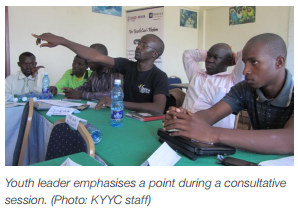A Snapshot of Evaluative Thinking: Democracy and Youth Mobilization in Kenya
This brief post consolidates the key takeaways from the recent study “Embracing Evaluative Thinking For Better Outcomes,” conducted by InterAction and the Centre for Learning on Evaluation and Results for Anglophone Africa (CLEAR-AA). The case study featured in this post focuses on Winrock International's work in Kenya. Most of the text is borrowed directly from the report. To learn more about evaluative thinking and the experiences of the four NGOs highlighted, please download the full report.
About Evaluative Thinking
At any given time, how do we know how effective our strategies, operations, or programs are? In other words, how do we assess the quality and value of our work? How do we know how well we are meeting the needs of those for whom we work? How will we know if our efforts are having any unintended effects, positive or negative, and for whom?
Finding out requires more than simply collecting and analyzing monitoring data or undertaking and using evaluations, since monitoring data on its own might not tell a full story, and evaluations might not anticipate and respond to all relevant questions. We also need to explore questions of quality, value, and importance, as well as how they inform our assumptions, judgments about what is good or not, and decision making.
Evaluative thinking is ongoing, systematic inquiry and learning about quality and perceptions of what is important.
Below is a summary of a case study from a youth and democracy project in Kenya. It highlights why the organization decided to integrate evaluative thinking into its work, even if at the time they did not necessarily give what they were doing that name. It then describes the organization’s evaluative thinking processes and the decisions they informed; identifies factors that enabled evaluative thinking in the organizations, as well as challenges the team faced; and provides lessons learned useful beyond their organizational contexts. Much more information is provided in the full report.
Case Study Highlights
 Responding to the specific sources of vulnerability, marginalization, and dissatisfaction among Kenyan youth after the 2007-08 post-election violence required Winrock and other project stakeholders to constantly reflect on and question the way things are done. As a result of the complex situation, USAID, Winrock, implementing partners, and youth took an evaluative thinking approach strategic planning, which contributed to several significant changes in the project.
Responding to the specific sources of vulnerability, marginalization, and dissatisfaction among Kenyan youth after the 2007-08 post-election violence required Winrock and other project stakeholders to constantly reflect on and question the way things are done. As a result of the complex situation, USAID, Winrock, implementing partners, and youth took an evaluative thinking approach strategic planning, which contributed to several significant changes in the project.
Process: In response to concerns that the planned engagement strategy would not effectively reach youth, Winrock and USAID conducted joint field visits during program start-up to better understand the youth population. As a result, a new activity was included that called for mobilizing youth into units and conducting elections at the village level. The effort began to draw negative political reactions in the local media, so the program began having joint meetings between the donor, the implementing partners, and the youth leaders to address the backlash. These meetings evolved over time and contributed to iterative changes throughout implementation.
Enabling factors: There was a mutually strong desire among the donor and implementing partners to realize project goals and empower youth beyond the funding period. The desire fueled closer donor involvement and participation in project implementation. Finally, given the real fears of another eruption of violence, any project action or activity required reflection and swift evaluation.
Challenges: Charges as a result of the evaluative thinking process often required the program to seek permission from USAID to make project modifications. Due to close collaboration between USAID and its partners, this potential problem was mitigated significantly. Resistance of all parties – the youth, the donor, and the implementing partners – to the realities the evaluative thinking process revealed, particularly in regard to taking on risk, was often a barrier to overcome.
Lessons learned: The frequency of evaluative thinking and the low cost involved, compared to traditional evaluations, enable project managers to address issues in real time. It also helps identify key issues that may not have been anticipated in program design. A donor's close engagement with implementing partners enable mutual learning and make it possible for all partners to accept changes in implementation. Finally, flexibility among the donor and project implementers is a result of reflective thinking, which challenges tradition and routine practices in programming for change.
Read more case studies in evaluative thinking:



